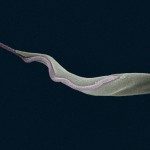Link to Pubmed [PMID] – 12183561
Infect. Immun. 2002 Sep;70(9):5115-23
Trypanosoma cruzi proteinases are involved in host cell invasion in human patients and in mouse models. In mice, murine alpha(2)-macroglobulin (MAM) and murinoglobulin are circulating plasma proteinase inhibitors that also have important roles in inflammation and immune modulation. To define their role in experimental Chagas disease, we investigated the susceptibility to T. cruzi infection of mice that are deficient only in alpha2-macroglobulins (AM-KO) or in both MAM and monomeric murinoglobulin-1 (MM-KO), relative to the wild type (WT). Despite the high parasite load, parasitemia was lower in AM-KO and MM-KO mice than in WT mice. Nevertheless, we observed a significantly higher parasite load in the hearts of AM-KO and MM-KO mice, i.e., more amastigote nests and inflammatory infiltrates than in WT mice. This result demonstrates a protective role for MAM in the acute phase of murine T. cruzi infection. We further demonstrated in vitro that human alpha2-macroglobulins altered the trypomastigote morphology and motility in a dose-dependent way, and that also impaired T. cruzi invasion in cardiomyocytes. Finally, we demonstrated that the levels of transforming growth factor beta in AM-KO mice increased significantly in the third week postinfection, concomitant with high amastigote burden and important fibrosis. Combined, these in vivo and in vitro findings demonstrate that the MAM contribute to the resistance of mice to acute myocarditis induced by experimental T. cruzi infection.
